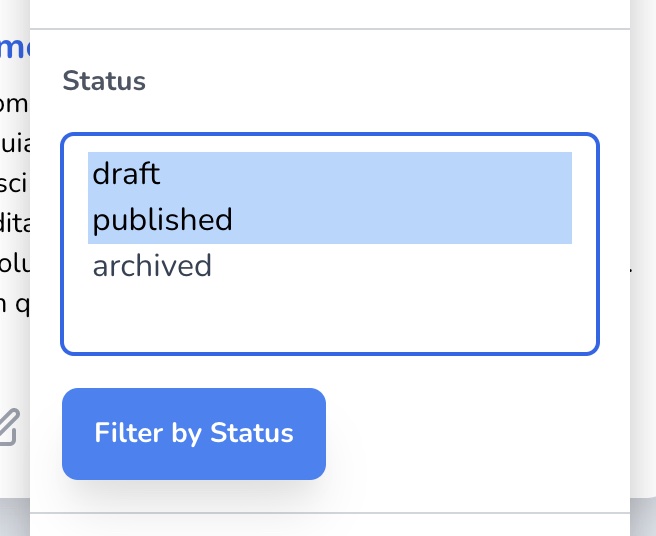# Filters
Filters allow you to better scope the index queries for records you are looking for.
# Defining filters
Avo has two types of filters available at the moment Boolean filter and Select filter.

# Boolean Filter
You generate one running bin/rails generate avo:filter featured_filter creating a filter configuration file.
class FeaturedFilter < Avo::Filters::BooleanFilter self.name = 'Featured filter' def apply(request, query, values) query end def options {} end endCopied!
Each filter file comes with a name, apply and options methods.
The name method lets you set the name of the filter.
The apply method is responsible for filtering out the records by giving you access to modify the query object. The apply method also gives you access to the current request object, and the passed values. The values object is a Hash containing all the configured options with the option name as the key and true/false as the value.
# Example values payload { is_featured: true, is_unfeatured: false, }Copied!
The options method defines the available values of your filter. They should return a Hash with the option id as a key and option label as value.
The finished filter might look something like this.
class FeaturedFilter < Avo::Filters::BooleanFilter self.name = 'Featured status' def apply(request, query, values) return query if values[:is_featured] && values[:is_unfeatured] if values[:is_featured] query = query.where(is_featured: true) elsif values[:is_unfeatured] query = query.where(is_featured: false) end query end def options { 'is_featured': 'Featured', 'is_unfeatured': 'Unfeatured', } end endCopied!
# Default value
You can set a default value to the filter so it has a predetermined state on load. To do that return the state you desire it from the default method.
class FeaturedFilter < Avo::Filters::BooleanFilter self.name = 'Featured status' def apply(request, query, values) return query if values[:is_featured] && values[:is_unfeatured] if values[:is_featured] query = query.where(is_featured: true) elsif values[:is_unfeatured] query = query.where(is_featured: false) end query end def default { is_featured: true } end def options { 'is_featured': 'Featured', 'is_unfeatured': 'Unfeatured', } end endCopied!
# Select Filter
Select filters are similar to Boolean ones. You generate one running rails generate avo:filter published_filter --select.
The biggest difference from the Boolean filter is in the apply method. You only get back one value attribute, which represents which entry from the options method is selected.
A finished, select filter might look like this.
class PublishedFilter < Avo::Filters::SelectFilter self.name = 'Published status' def apply(request, query, value) case value when 'published' query.where.not(published_at: nil) when 'unpublished' query.where(published_at: nil) else query end end def options { 'published': 'Published', 'unpublished': 'Unpublished', } end endCopied!
# Default value
The select filter supports setting a default too.
class PublishedFilter < Avo::Filters::SelectFilter self.name = 'Published status' def apply(request, query, value) case value when 'published' query.where.not(published_at: nil) when 'unpublished' query.where(published_at: nil) else query end end def default 'published' end def options { 'published': 'Published', 'unpublished': 'Unpublished', } end endCopied!
# Multiple select filter
You may also use a multiple select filter.
class PostStatusFilter < Avo::Filters::MultipleSelectFilter self.name = "Status" def apply(request, query, value) query.where(status: value.map(&:to_i)) end def options Post.statuses.invert end endCopied!

# Dynamic options
The select filter can also take dynamic options:
class AuthorFilter < Avo::Filters::SelectFilter self.name = 'Author' def apply(request, query, value) query = query.where(author_id: value) if value.present? query end def options Author.select(:id, :name).each_with_object({}) { |author, options| options[author.id] = author.name } end endCopied!
# Text Filter
You can also add complex text filters to Avo by running rails generate avo:filter name_filter --text.
class NameFilter < Avo::Filters::TextFilter self.name = "Name filter" self.button_label = "Filter by name" def apply(request, query, value) query.where('LOWER(name) LIKE ?', "%#{value}%") end endCopied!
# Registering filters
To add an filter to one of your resources, you need to declare it on the resource using the filter method.
class PostResource < Avo::BaseResource self.title = :name self.search = :id field :id, as: :id # other fields filter PublishedFilter endCopied!
